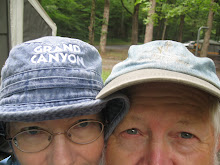I hesitated about publishing this post. If I’m to record my retirement journey accurately, however, concerns about the members of our family who are a generation older than me figure prominently. My husband and I are officially “elders.” We are blessed with “older” elders--would that be “elder” elders?--who have taught by example. They have shown us how to prepare for and experience a rich and full “elder” life. They have also set a high standard on how to face loss and serious medical conditions with courage, creativity and determination.
There have been instances, however, when they have been less than forthcoming about physical symptoms prior to our taking them on a trip or facilitating their participation in a particular activity. I have asked myself “Why didn’t I question their decision instead of going along with it?
The risks have ranged from diminished health or quality of life to the potential loss of life. After our most recent scare, my husband and I are determined to do better--as in being more assertive--about probing for straight answers in order to reveal potentially risky situations.
But why do they take the risk? Are they reluctant to lose what potentially could be a last chance to engage in a given experience? Do they think a change of plans would inconvenience others and they don’t want to cause trouble for someone else? Or, as another relative suggested, is it a case of being in denial? I have no answers at this time, just more questions. It has me thinking about my own decisions about health now and how I am likely to make decisions in the future.
A scientific study of elders’ decision-making capabilities, recently reported in the American Psychological Association’s journal Psychology and Aging, focused on money-making decisions. But the researchers’ findings ring true for other areas, too. Their suggestions for cranking up the quality of decisions reminds me of what I have already observed and how I can help when I am directly involved in the decision-making process. The two biggies were 1) to allow the individuals more time for making decisions, and 2) to present the information that the individuals need in a way that best assists them in making decisions. Go here for a Duke Medicine News and Communications news release on the research results.

they are "supreme" elders. -Jeremy
ReplyDelete@Jeremy - Ha! Your nomenclature is based on your acquaintance with these supreme elders, I presume! Does have a good ring to it, though, sort of Star Warsish.
ReplyDeleteBeen in the same place as you. Its difficult at best. I think its hard for any of us to give up our control over our own lives. part denial but also it says the end is coming sooner than perhaps we would like.
ReplyDeleteIts one of the rea
sons we moved to our Forever Home 3 years ago. Moving and unearthing and selling things was the best thing we could have done. We went from a 2 story home to a ranch style. The idea of stairs as we would get older started to scare us. Besides we wanted to be closer to our kids.
We had to deal with both sets of parents before they passed away. It gave us a glimpse into the difficulties of the "elders" I don't want our kids to have to go through some of the things we had to do. Life isn't perfect but I think we have made it a bit easier for our own kids.
@photowannabe - Your comments were on target and encouraging. Husband and I continue to learn from the mothers who Jeremy (above) christened "supreme elders."
ReplyDelete